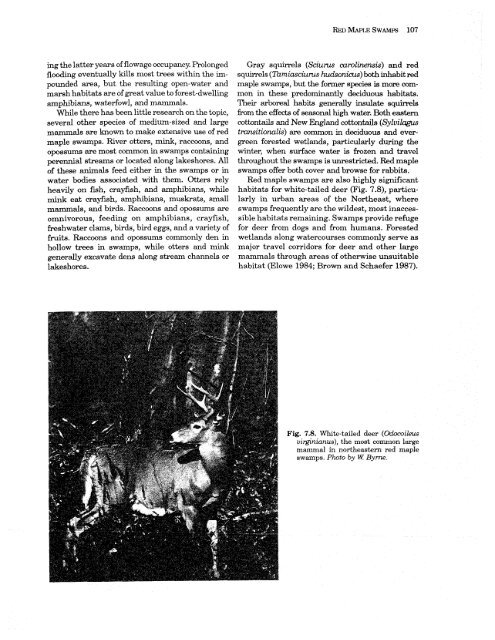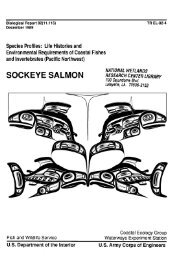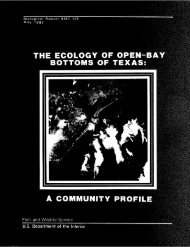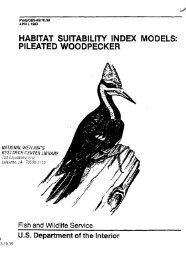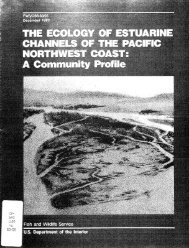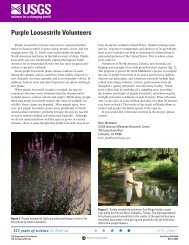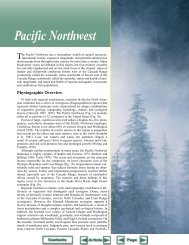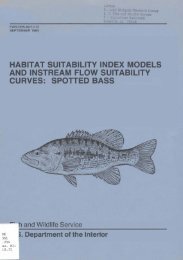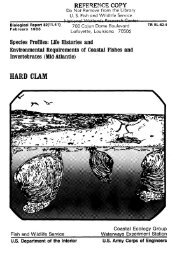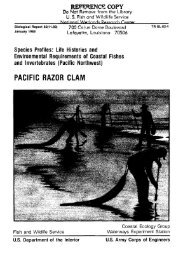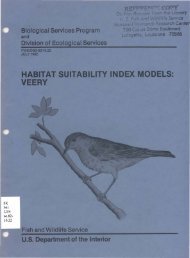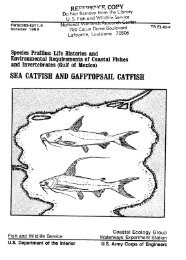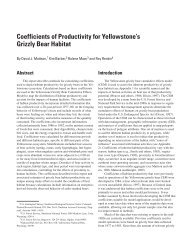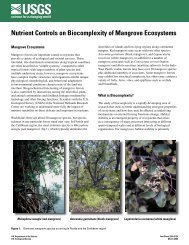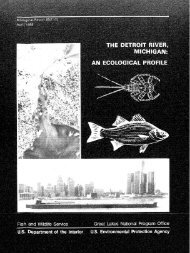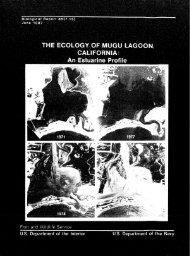Ecology of Red Maple Swamps in the Glaciated Northeast: A ...
Ecology of Red Maple Swamps in the Glaciated Northeast: A ...
Ecology of Red Maple Swamps in the Glaciated Northeast: A ...
You also want an ePaper? Increase the reach of your titles
YUMPU automatically turns print PDFs into web optimized ePapers that Google loves.
<strong>in</strong>g <strong>the</strong> latter years <strong>of</strong> flowage occupancy. Prolonged<br />
flood<strong>in</strong>g eventually kills most trees with<strong>in</strong> <strong>the</strong> impounded<br />
area, but <strong>the</strong> result<strong>in</strong>g open-water and<br />
marsh habitats are <strong>of</strong> great value to forest-dwell<strong>in</strong>g<br />
amphibians, waterfowl, m d mammals.<br />
While <strong>the</strong>re has been little research on <strong>the</strong> topic,<br />
several o<strong>the</strong>r species <strong>of</strong> medium-sized and large<br />
mammals are known to make extensive use <strong>of</strong> red<br />
maple swamps. River otters, m<strong>in</strong>k, raccoons, and<br />
opossums are most common <strong>in</strong> swamps conta<strong>in</strong><strong>in</strong>g<br />
perennial streams or located along lakeshores. All<br />
<strong>of</strong> <strong>the</strong>se animals feed ei<strong>the</strong>r <strong>in</strong> <strong>the</strong> swamps or <strong>in</strong><br />
water bodies associated with <strong>the</strong>m. Otters rely<br />
heavily on fish, crayfish, and amphibians, while<br />
m<strong>in</strong>k eat crayfish, amphibians, muskrats, small<br />
mammals, and birds. Raccoons and opossums are<br />
omnivorous, feed<strong>in</strong>g on amphibians, crayfish,<br />
freshwater clams, birds, bird eggs, and a variety <strong>of</strong><br />
fruits. Raccoons and opossums commonly den <strong>in</strong><br />
hollow trees <strong>in</strong> swamps, while otters and m<strong>in</strong>k<br />
generally excavate dens along stream channels or<br />
lakeshores.<br />
Gray squirrels (Sciurus cuml<strong>in</strong>emis) and red<br />
squirrels (~miasciurus hudsonicus) both <strong>in</strong>habit red<br />
maple swamps, but <strong>the</strong> former species is more common<br />
<strong>in</strong> <strong>the</strong>se predom<strong>in</strong>antly deciduous habitats.<br />
?"heir arboreal habits generally <strong>in</strong>sulate squirrels<br />
from <strong>the</strong> effeds <strong>of</strong> seasonal high water. Both eastem<br />
cottontails and New England cottontails (Sylvi2agus<br />
tnznsitioruzlis) are aremmon <strong>in</strong> deciduous and evergreen<br />
forested wetlands, particularly dw<strong>in</strong>g <strong>the</strong><br />
w<strong>in</strong>ter, when surface water is frozen and travel<br />
throughout <strong>the</strong> swamps is unrestricted. <strong>Red</strong> maple<br />
swamps <strong>of</strong>fer both cover and browse for rabbits.<br />
<strong>Red</strong> maple swamps are also highly significant<br />
habitats for white-tailed deer (Fig. 7.8), particularly<br />
<strong>in</strong> urban areas <strong>of</strong> <strong>the</strong> Nor<strong>the</strong>ast, where<br />
swamps frequently are <strong>the</strong> wildest, most <strong>in</strong>accessible<br />
habitats rema<strong>in</strong><strong>in</strong>g. <strong>Swamps</strong> provide refuge<br />
for deer from dogs and from humans. Forested<br />
wetlands along watercourses commonly serve as<br />
major travel corridors for deer and o<strong>the</strong>r large<br />
mammals through areas <strong>of</strong> o<strong>the</strong>rwise unsuitable<br />
habitat (Elowe 1984; Brown and Schaefer 1987).<br />
Fig. 7.8, I4 'hite-tailed deer (& mi&<br />
uirg<strong>in</strong>iar; us), <strong>the</strong> most comnnor I large<br />
mammal <strong>in</strong> nor<strong>the</strong>astern red maple<br />
swamps. Pbto by W Byrne.


